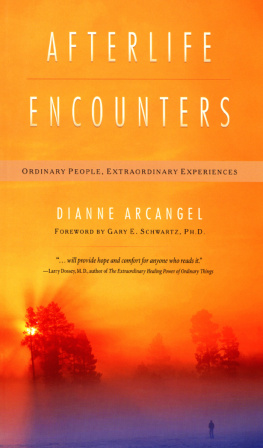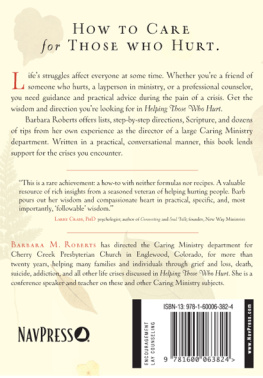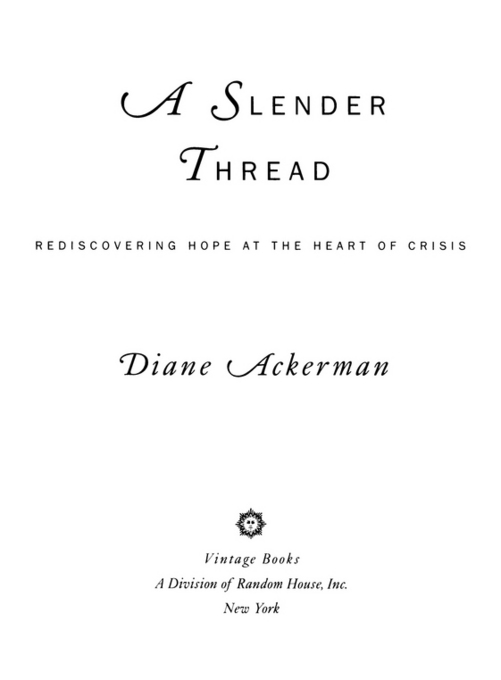Acclaim for Diane Ackermans
AS LENDER T HREAD
Compelling astonishing Ackerman brilliantly captures the intimacy and intensity of her work.
People
A fascinating rumination on why and how we fight to stay alive.
Glamour
Ackermans gifts are prodigious: supple prose, an eye for detail, original metaphor, a generosity of self. But the overriding strength of this book is how, through anecdote and rumination, she takes the pejorative sting out of depression and suicide.
Philadelphia Inquirer
Frequently breathtaking, particularly when Ackerman tackles the subjects of depression and death A Slender Thread inhabits the dark corridors of the human mind.
Time Out New York
Ackerman is a profound and generous observer of the world around her. All the blues can be swept away by her vibrant prose.
Entertainment Weekly
An eloquent study of empathy, human relationships and the art of listening a thoughtful and remarkably readable book.
Arizona Republic
In lesser hands, the subject matter could have become dark and dreary. However, Ackerman has crafted a work that is uplifting and restorative.
Tulsa World
Ackerman is a creative, knowledgeable and rhapsodic natural historian utterly fascinated by how animals live, and by what they can teach us about ourselves, the Earths most perplexing creatures.
Chicago Tribune
Books by Diane Ackerman
A Slender Thread
The Rarest of the Rare
A Natural History of Love
The Moon by Whale Light
Jaguar of Sweet Laughter: New and Selected Poems
A Natural History of the Senses
Reverse Thunder
On Extended Wings
Lady Faustus
Twilight of the Tenderfoot
Wife of Light
The Planets: A Cosmic Pastoral
For Children
Monk Seal Hideaway
Diane Ackerman
AS LENDER T HREAD
Poet, essayist, and naturalist, Diane Ackerman was born in Waukegan, Illinois. She received an M.A., M.F.A., and Ph.D. from Cornell University. Her poetry has been published in many leading literary journals, and in the books The Planets: A Cosmic Pastoral (1976), Wife of Light (1978), Lady Faustus (1988), and Jaguar of Sweet Laughter: New And Selected Poems (1991).
Her works of nonfiction include A Slender Thread (1996); The Rarest of the Rare (1995); A Natural History of Love (1994); The Moon by Whale Light and Other Adventures Among Bats, Crocodilians, Penguins, and Whales (1991); A Natural History of the Senses (1990); and On Extended Wings (1985), a memoir of flying. Her bestselling A Natural History of the Senses was the basis for a PBS television series, Mystery of the Senses, in which she was featured as host and narrator. Monk Seal Hideaway, her first childrens book, appeared recently, and she is writing other nature books for children.
Ms. Ackerman has received the Academy of American Poets Lavan Award, and grants from the National Endowment for the Arts and the Rockefeller Foundation, among other recognitions. Honored as a Literary Lion by the New York Public Library, she has taught at several universities, including Columbia and Cornell. Her essays about nature and human nature have appeared in National Geographic, The New Yorker, The New York Times, Parade, and other journals.
First Vintage Books Edition, April 1998
Copyright 1997 by Diane Ackerman
All rights reserved under International and Pan-American Copyright Conventions. Published in the United States by Vintage Books, a division of Random House, Inc., New York, and simultaneously in Canada by Random House of Canada Limited, Toronto. Originally published in hardcover in the United States by Random House, Inc., New York, in 1997.
Eclipse was originally published in Travel-Holiday.
Grateful acknowledgment is made to the following for permission to reprint previously published material:
Random House, Inc.: On Looking into Sylvia Plaths copy of Goethes Faust from Jaguar of Sweet Laughter by Diane Ackerman. Copyright 1991 by Diane Ackerman. Reprinted by permission.
Random House, Inc., and Faber and Faber Limited: Six lines from To You Simply from W. H. Auden: Collected Poems by W. H. Auden. Copyright 1945 by W. H. Auden.
Rights throughout the British Commonwealth are controlled by Faber and Faber Limited. Reprinted by permission of Random House, Inc., and Faber and Faber Limited.
The Library of Congress has catalogued the Random House edition as follows:
Ackerman, Diane.
A slender thread/Diane Ackerman.1st ed.
p. cm.
eISBN: 978-0-307-76336-5
1. Crisis interventionPsychiatry. 2. HotlinesCounseling.
3. SuicidePrevention.
I. Title.
RC480.6.A25 1997
362.204256dc20 96-8721
Random House Web address: http://www.randomhouse.com/
v3.1
The narrative that follows is based on my actual experiences. However, to protect the privacy of callers, Ive changed their names, whereabouts, and some circumstantial details of their lives, and my colleagues on the crisis line have been kind enough to check the manuscript to ensure confidentiality. Any similarity to real individuals arises from the wealth of experiences and feelings all people share. I have not attempted to disguise people and events reported in the newspapers or other media, since these dramas are already public knowledge.
DIANE ACKERMAN
August 1, 1996
CONTENTS
PREFACE
At the edge of the town I live in, a converted depot restaurant called The Station reminds us of days when train cars shuffled in a long conga line to Manhattan. A clock outside the restaurant froze at 6:22, when the last iron fury left town, but the trains of circumstance have never stopped running.
Towns are like railroad stations, where at any moment hundreds of lives convergepeople carrying small satchels of worry or disbelief, people racing down the slippery corridors of youth, people slowly dragging the steamer trunk of a trauma, people fresh from the suburbs of hope, people troubled by timetables, people keen to arrive, people whose minds are like small place settings, people whose aging faces are sundials, people desperate and alone who board a bullet train in the vastness of nothing and race hell-bent to the extremities of nowhere. In time, everyone meets everyone, either by repute or in person. When they are at their most frightened, desperate or alone, they sometimes phone Suicide Prevention and Crisis Service.
Its phone number can be easily found in the telephone directory or on posters strategically placed around town, but its whereabouts is a closely guarded secret. Its as if the people who worked there belonged to a mystery cult. Their names may not be spoken. Their ages may not be given. Their professions may not be hinted at. Because they touch the lives of desperate people, as well as of normal people in desperate moments, the address of the building may not be revealed. Counselors enter and leave it discreetly, even furtively at times. Yet in that building the blood and guts of human life, the minor sorrows and the bright catastrophes play themselves out. It is an emotional landscape that alternately expands and shrinks; one moment it may swell to the size of a remembered battle in Zaire, and the next it may huddle in the corner of a dorm room. The faces of the callers and counselors must be masked, but I can tell you about their struggles. The same is true of the building. I am not free to describe its facade, but I can tell you about its inner life.



















